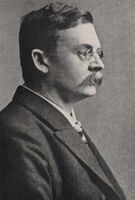Albert Grünwedel
| PersonType | Category:Authors of German Works |
|---|---|
| FirstName / namefirst | Albert |
| LastName / namelast | Grünwedel |
| MainNamePhon | Albert Grünwedel |
| SortName | Grünwedel, Albert |
| bio | Albert Grünwedel (31 July 1856 – 28 October 1935) was a German Indologist, Tibetologist, archaeologist, and explorer of Central Asia. He was one of the first scholars to study the Lepcha language.
Grünwedel was born in Munich in 1856, the son of a painter. He studied art history and Asian languages, including Avestan, and in 1883 earned his doctorate at the University of Munich. In 1881 he began work as an assistant at the Museum of Ethnology in Berlin and in 1883 he was appointed deputy director of the ethnographic collection. Grünwedel won accolades for his numerous publications on Buddhist art, archaeology Central Asia, and Himalayan languages. Two notable works were Buddhist art in India (1893) and Mythology of Buddhism in Tibet and Mongolia (1900), which concerned the Greek origins of the Gandharan Greco-Buddhist artistic style and its development in Central Asia. In 1899 Grünwedel was invited to join a Russian archaeological research expedition led by Vasily Radlov into the north of Xinjiang province, China. In the same year he was appointed a member of the Bavarian Academy of Sciences. In 1902-1903 Grünwedel led the first German expedition to Turpan, in Xinjiang, becoming the first modern European to study the massive ruins near Gaochang. He recorded the events of this expedition in his book Report on Archaeological work in Idikutschahri and Surrounding areas in Winter 1902-1903 (1905). The next expedition was led by Albert von Le Coq, who became famous for removing large numbers of frescos from sites across Xinjiang. Grünwedel himself headed the third German Turfan expedition in 1905–1907, the results of which were published in Ancient Buddhist Religion in Chinese Turkistan (1912). Grünwedel's expeditions were largely funded by the Krupp family. Grünwedel was joined by Heinrich Lüders who made major contributions to the epigraphical analysis of the Turpan-Expedition findings after being called to the Friedrich-Wilhelms-University Berlin as Professor for oriental languages in 1909. Grünwedel retired in 1921, and in 1923 moved to Bavaria, where his spent his last years at Bad Tölz writing a number of scientific papers. (Source Accessed Jan 15, 2024) |
| YearBirth | 1856 |
| YearDeath | 1935 |
| BornIn | Munich |
| Other wikis |
If the page does not yet exist on the remote wiki, you can paste the tag |

